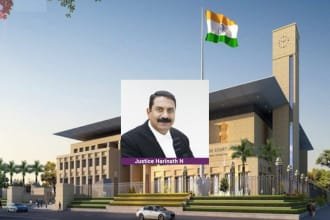In a critical move targeting urban policy inconsistency and civic inequity, the Supreme Court of India has issued notice to the Union Ministry of Housing and Urban Affairs, Delhi Government, Delhi Development Authority (DDA), and Municipal Corporation of Delhi (MCD), seeking explanations on the regularisation of affluent unauthorised colonies in Delhi.
The notice, issued by a Bench comprising Justice Abhay S Oka and Justice Ujjal Bhuyan on April 30, 2025, has brought the controversial protection of high-profile illegal colonies back into the spotlight, raising essential questions about urban planning, rule of law, and selective regularisation policies.
Backdrop: Affluent Illegal Colonies in Focus
The matter came up during a hearing in the long-standing MC Mehta v. Union of India environmental case. Based on the status report filed by MCD, the Supreme Court was apprised of ongoing attempts to shield illegal constructions in high-end unauthorised colonies such as:
- Sainik Farms
- Anant Ram Dairy
- Defence Services Enclave
- Anupam Gardens
- Freedom Fighters Enclave
- Bhavani Kunj
- Rajokri Enclave
- Shri Sai Kunj
These colonies are known to house politicians, senior bureaucrats, business tycoons, and retired defence officials, making their regularisation politically sensitive and socially controversial.
Supreme Court’s Concern: Selective Application of Law
The Court noted that while some legislative protection to slum dwellers can be viewed as a compassionate policy, the blanket regularisation of affluent illegal colonies is deeply problematic.
“We can understand some benevolent gesture on the part of the authorities in protecting slum dwellers. But effort is being made, somehow with the help of regulations or legislations, to regularise unauthorised colonies of affluents,” the Bench remarked.
This observation underscores a core inconsistency: why are the affluent being extended the same protection as the urban poor under laws meant to address housing insecurity?
PM-UDAY Scheme Misused?
At the heart of the controversy is the PM-UDAY Scheme (Pradhan Mantri – Unauthorized Colonies in Delhi Awas Adhikar Yojana), introduced to grant ownership rights to residents of unauthorised colonies.
However, the Supreme Court emphasized that:
- Affluent colonies were explicitly excluded from the scope of the scheme under the 2019 regulations.
- *Shri Sai Kunj, one such affluent colony, appears at Serial No. 43 in the exclusion list.
- MCD still cited PM-UDAY in its affidavit to justify Sai Kunj’s regularisation—despite knowing its inapplicability.
“Firstly, we do not find any reference to PM Uday Scheme anywhere. Secondly, under Regulation 7, affluent unauthorised colonies have been excluded… MCD owes an explanation to the court,” the Court stated.
The Court directed MCD to issue notices under Sections 343/344 of the Delhi Municipal Corporation Act to the remaining 88 illegal flats in Sai Kunj within a week, holding them accountable under demolition and sealing provisions.
Amicus Curiae’s Submission: Rule of Law Undermined
Senior Advocate Anitha Shenoy, appearing as Amicus Curiae, highlighted that authorities were misusing the law to protect the rich and powerful, while overlooking statutory exclusions.
Another senior counsel, S Guru Krishna Kumar, went further to say:
“It can’t be that the city runs on unauthorised constructions and they being regularised… Something is seriously wrong.”
These submissions underline a growing urban governance crisis: the erosion of planning laws in favour of the elite, often at the cost of environmental balance and civic order.
The Legal Irony: Illegal Yet Protected
The Court criticized the repeated attempts to circumvent demolition orders, observing a pattern of legal manipulation where regulations are tailored or interpreted to accommodate those with influence.
This includes the use of:
- Special Provisions Acts
- Relaxation Schemes
- Deliberate delay in enforcement
The Court noted that out of 126 flats in Shri Sai Kunj, only 10 were legally protected, yet show cause notices were issued to only 28, leaving 88 unaccounted for—a clear case of selective enforcement.
Implications for Urban Planning and Public Trust
This case is not merely about unauthorised buildings but about the future of urban development in India. The legalisation of elite lawbreakers not only sends a damaging message to common citizens, but it also:
- Strains civic infrastructure (water, sewage, roads)
- Violates environmental norms
- Undermines city master plans
- Breeds administrative corruption
Moreover, this trend widens the gap between the rich and the poor. While slum dwellers are often evicted or neglected, affluent encroachments are rewarded with legitimacy.
Looking Ahead: What the Supreme Court May Do
With the Centre and Delhi authorities now under judicial scrutiny, the Supreme Court’s next steps could include:
- Invalidating protection granted under PM-UDAY to excluded colonies.
- Issuing directions for demolition or penalties.
- Mandating strict compliance with zoning and planning laws.
- Holding officials accountable for wilful neglect or complicity.
The Court’s firm stance is also likely to trigger policy reviews and force the Delhi Government, DDA, and MCD to adopt transparent, lawful urban development practices.
Conclusion: Equal Law for Unequal Citizens?
The Supreme Court’s intervention is a bold reminder that urban laws must not be a privilege for the few. Regularising unauthorised colonies built by the powerful not only destroys the sanctity of planning but also betrays the principle of equality before law.
If the rule of law is to hold meaning, then illegal constructions—whether by the rich or the poor—must be judged by the same yardstick. The coming weeks will reveal whether India’s civic and political establishment is willing to uphold this standard.


